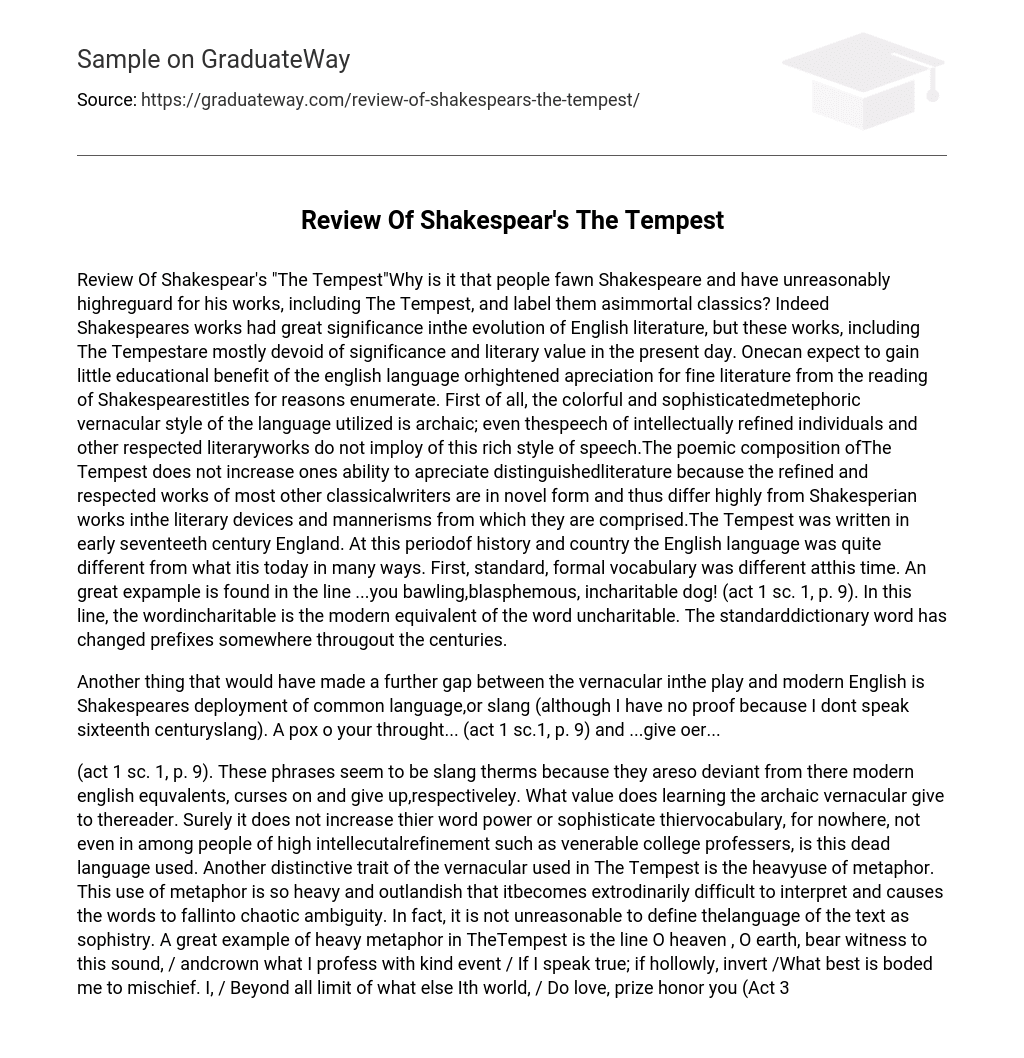Why is it that people fawn Shakespeare and have unreasonably highreguard for his works, including The Tempest, and label them asimmortal classics? Indeed Shakespeares works had great significance inthe evolution of English literature, but these works, including The Tempestare mostly devoid of significance and literary value in the present day.
Onecan expect to gain little educational benefit of the english language orhightened apreciation for fine literature from the reading of Shakespearestitles for reasons enumerate. First of all, the colorful and sophisticatedmetephoric vernacular style of the language utilized is archaic; even thespeech of intellectually refined individuals and other respected literaryworks do not imploy of this rich style of speech.
The poemic composition of The Tempest does not increase ones ability to apreciate distinguishedliterature because the refined and respected works of most other classicalwriters are in novel form and thus differ highly from Shakesperian works inthe literary devices and mannerisms from which they are comprised.
The Tempest was written in early seventeeth century England. At this periodof history and country the English language was quite different from what itis today in many ways. First, standard, formal vocabulary was different atthis time. An great expample is found in the line …you bawling,blasphemous, incharitable dog! (act 1 sc. 1, p. 9).
In this line, the wordincharitable is the modern equivalent of the word uncharitable. The standarddictionary word has changed prefixes somewhere througout the centuries. Another thing that would have made a further gap between the vernacular inthe play and modern English is Shakespeares deployment of common language,or slang (although I have no proof because I dont speak sixteenth centuryslang). A pox o your throught… (act 1 sc.1, p. 9) and …give oer… (act 1 sc. 1, p. 9).
These phrases seem to be slang therms because they areso deviant from there modern english equvalents, curses on and give up,respectiveley. What value does learning the archaic vernacular give to thereader. Surely it does not increase thier word power or sophisticate thiervocabulary, for nowhere, not even in among people of high intellecutalrefinement such as venerable college professers, is this dead language used. Another distinctive trait of the vernacular used in The Tempest is the heavyuse of metaphor. This use of metaphor is so heavy and outlandish that itbecomes extrodinarily difficult to interpret and causes the words to fallinto chaotic ambiguity.
In fact, it is not unreasonable to define thelanguage of the text as sophistry. A great example of heavy metaphor in TheTempest is the line O heaven , O earth, bear witness to this sound, / andcrown what I profess with kind event / If I speak true; if hollowly, invert /What best is boded me to mischief. I, / Beyond all limit of what else Ith world, / Do love, prize honor you (Act 3 sc. 1, p. 95). In modernterms, this means: Lord, bear witness to what I say, and bless my claim (tothis woman). Let me be damned if I lie when I say that I love honor, prizeand honor you above anything else in the world. The learning of this typeof heavy usage of metaphor would be justified if it were imployed in manyother respected classic works or in modern eloquent speech, but it is not.
Metaphoric speech outside of literature and informal speech is reguardedas crude and unsophisticated in modern speech.This is so because peoplehave come to reguard refined speech as being characteristic with the use of alarge vocabulary consisting of consise and sophisticated words. Even if the argument is made that one cannot gain much benefit in refiningtheir speech by reading The Tempest, Shakespeare aficianados claim that thereis value in the mechanics and devices common in literature which can belearned from his works. This is exaggerated, however. The most valubleliterary device that can be learned from The Tempest is the metaphor.
However, as I said before, Shakespeare over uses this so much that his wordsfall into sophistry. A good example is the line Or that there were such men/ Whose head stood in their breasts? (act 3 sc. 3, p.113). I can make nosense out of this whatsoever. Another outlandish metaphor is Which now wefind / Each putter-out of five for one will bring us / Good warrant of (act3 sc. 3, p. 113). However, a foot note explains that line makes reference tothe fact that because of the danger involved in travel at the time, atraveler could give a sum of money to a broker and collect five times hisdeposit if he could successfully return from his voyage. However, this isout of context with the preceeding lines in which Gonzalo is lamenting on theimmoratlity of the others.
As you can see, Shakespeares use of metaphor isnot as exemplary as it is reputated. As for respecting The Tempest for itsuseage of other literary devices, one might as well proclaim a VCRinstruction booklet as a great classic piece of literature. I say thisbecause The Tempest is an epic poem, and not a novel. There is no greatcomparison with the usage of elements of this drama which was intended to beperformed, not read. For starters, the characters of the play are onedimensional.
For example, Prospero is an all powerful sorcerer who is bentonly on retribution for Antonio, the usurper of his thrown. There are noother aspects of Prosperos personality seen in the play, and very littleabout his intimate thoughts and feelings which is so common in many classicpieces of literature.
If The Tempest is still viewed in the twentieth century to by a great pieceof literature by so many respectable authorities of literature, then theymight as well go ahead and indiscriminately label other works devoid ofliterary merit as immortal classics – including the owners manual to my1989 Ford Taurus. Yes, Shakespeare did play a vital role in the evolution ofliterature, but the greatness of his work has been surpassed by far by otherauthors – authors which perhaps should be given more credit for theirendevours than a 433 year old has been.





